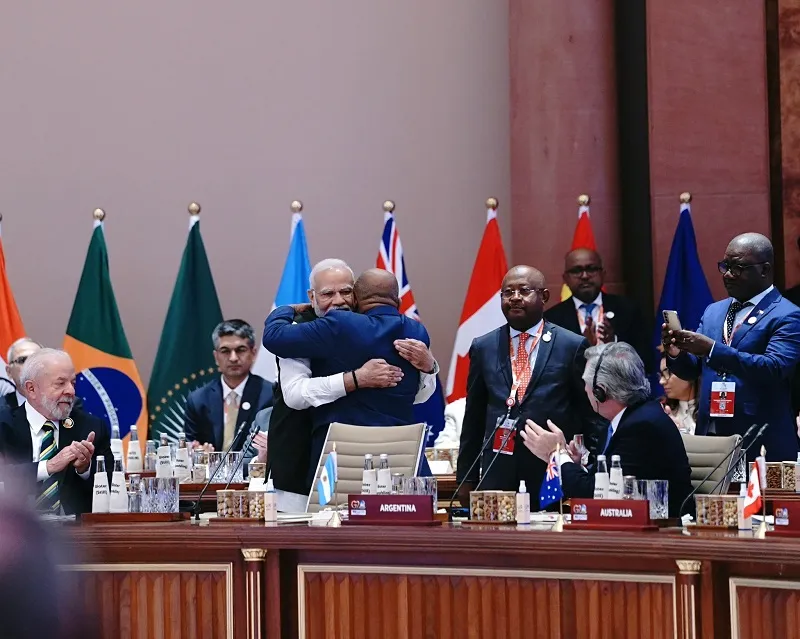

Comorian President and African Union Chairperson Azali Assoumani hugs Prime Minister Narendra Modi as he proceeds to take the bloc's permament chair in G20 grouping during the G20 Leaders' Summit in New Delhi on Saturday (Image courtesy: PIB)
The African Union, which is made up of 55 Member States representing all the countries on the African continent, became a permanent member of the G20 grouping under India’s ongoing presidency during the G20 Leaders’ Summit that began in New Delhi on Saturday.
As the world leaders gathered at Bharat Mandapam for the first session of the Summit in Pragati Maidan, Prime Minister Narendra Modi invited Comorian President and African Union Chairperson Azali Assoumani to take his seat with other permanent members at the high table.
“It is in the spirit of ‘Sabka Saath’ that India had proposed that the African Union be given the permanent membership of the G20. I believe that we all agree on this proposal. With the consent of all of you, I invite the Chair of the African Union to take his seat as a permanent member of the G20,” said PM Modi.
In a memorable moment watched live by millions all around the world, Assoumani hugged PM Modi as the bloc was inducted into G20.
The intergovernmental forum that connects the world’s major economies currently includes India, Argentina, Australia, Brazil, Canada, China, France, Germany, Indonesia, Italy, Japan, Mexico, South Korea, Russia, Saudi Arabia, South Africa, Turkey, the United Kingdom, the United States and the European Union.
India’s G20 Presidency has seen the largest-ever representation from Africa that includes South Africa (G20 member), Mauritius, Egypt, Nigeria, African Union (AU) Chair – Comoros, and African Union Development Agency-New Partnership for Africa’s Development (AUDA-NEPAD).
PM Modi has believed for a long time that the inclusion of the African Union would further amplify the voices from emerging countries and the Global South in the G20 forum.
In June, in a letter written to the leaders of G20 nations, the Indian PM proposed that the African Union be admitted as a full member at the New Delhi summit.
Having worked extensively to ensure that people of the Global South are no longer excluded from the fruits of development during its G20 Presidency, India declared Friday that the G20 New Delhi Leaders’ Declaration on Sunday will be one of the strongest documents to voice their concerns.
“The New Delhi Leaders’ Declaration, which many of you will see post the Summit, you will see it as a voice of the Global South and the developing countries. No document in the world would have such a strong voice for the Global South and the developing countries as the New Delhi Leaders’ Declaration,” said India’s G-20 Sherpa Amitabh Kant before the two-day summit.
Carrying forward Prime Minister Narendra Modi’s vision of utilising India’s current G20 presidency to give resonance to the voice of the Global South under the theme of ‘One Earth, One Family, One Future’, India has been marching ahead with its robust outreach to developing countries ever since assuming the leadership role in December 2022.
Maintaining that development is a core issue for the Global South, New Delhi has spotlighted that several countries who were severely impacted by the disruption caused by global Covid pandemic were delivered another strong blow due to the geopolitical tensions, resulting in major food, fuel, and fertilizer crisis.
“When India took over the presidency of G20 in Indonesia at Bali, we were in the midst of a scenario of slowing growth and productivity worldwide. There was a huge impact of Covid-19 pandemic which had led to vast segments of the global population going below the poverty line. Vast number of people had lost their jobs. There was a cost of living debt crisis. There had been a reversal on the sustainable development goals. There was a challenge of climate crisis and climate action,” mentioned Kant.
India felt that it should start its presidency with the theme of ‘Vasudhaiva Kutumbakam’ – the world is one family – with PM Modi making it clear that India’s presidency should be inclusive, decisive, ambitious and action-oriented.
Interestingly, in July, Iran – an observer state till now – got a full membership of the Shanghai Cooperation Organisation (SCO) under the rotating chairmanship of India.
In August, India again played a crucial role in BRICS reaching a consensus on expansion and admitting Argentina, Iran, Saudi Arabia, Egypt, Ethiopia and the United Arab Emirates as the new members with effect from January 2024.
Also Read: G20 Leaders’ Declaration will resonate Global South’s concerns as never before
Israel Defence Forces Spokesperson Brigadier General Effie Defrin on Thursday said that Iran has expressed…
India's Hindustan Aeronautics Limited (HAL) and French engine manufacturer, Safran Aircraft Engines, signed an agreement…
India has emerged as a country with the third-largest growth in power generation capacity globally…
Prime Minister Narendra Modi hailed Indian chess grandmaster Divya Deshmukh for defeating world number one…
The family of detained Baloch leader Mahrang Baloch has accused prison authorities at Quetta's Hudda…
The QS World University 2026 Rankings bring great news for our education sector, as the…